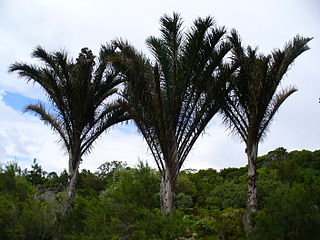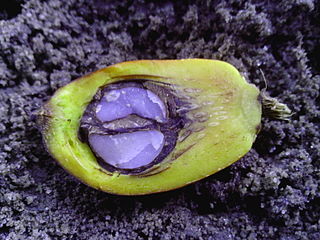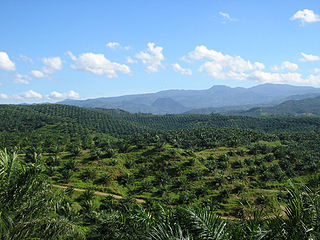
Nutella is a brand of sweetened hazelnut cocoa spread. Nutella is manufactured by the Italian company Ferrero and was first introduced in 1964, although its first iteration dates to 1963.

Palm oil is an edible vegetable oil derived from the mesocarp of the fruit of the oil palms. The oil is used in food manufacturing, in beauty products, and as biofuel. Palm oil accounted for about 33% of global oils produced from oil crops in 2014. Palm oils are easier to stabilize and maintain quality of flavor and consistency in processed foods, so are frequently favored by food manufacturers. On average globally, humans consumed 7.7 kg (17 lb) of palm oil per person in 2015. Demand has also increased for other uses, such as cosmetics and biofuels, creating more demand on the supply encouraging the growth of palm oil plantations in tropical countries.

Vegetable oils, or vegetable fats, are oils extracted from seeds or from other parts of fruits. Like animal fats, vegetable fats are mixtures of triglycerides. Soybean oil, grape seed oil, and cocoa butter are examples of seed oils, or fats from seeds. Olive oil, palm oil, and rice bran oil are examples of fats from other parts of fruits. In common usage, vegetable oil may refer exclusively to vegetable fats which are liquid at room temperature. Vegetable oils are usually edible.

Elaeis is a genus of palms containing two species, called oil palms. They are used in commercial agriculture in the production of palm oil. The African oil palm Elaeis guineensis is the principal source of palm oil. It is native to west and southwest Africa, occurring between Angola and Gambia. The American oil palm Elaeis oleifera is native to tropical Central and South America, and is used locally for oil production.
Palmitic acid, (or hexadecanoic acid in IUPAC nomenclature), is a fatty acid with a 16-carbon chain. It is the most common saturated fatty acid found in animals, plants and microorganisms. Its chemical formula is CH3(CH2)14COOH, and its C:D (the total number of carbon atoms to the number of carbon-carbon double-bonds) is 16:0. It is a major component of the oil from the fruit of oil palms (palm oil), making up to 44% of total fats. Meats, cheeses, butter, and other dairy products also contain palmitic acid, amounting to 50–60% of total fats. Palmitates are the salts and esters of palmitic acid. The palmitate anion is the observed form of palmitic acid at physiologic pH (7.4).

Raffia palms (Raphia) are a genus of about twenty species of palms native to tropical regions of Africa, and especially Madagascar, with one species also occurring in Central and South America. R. taedigera is the source of raffia fibers, which are the veins of the leaves, and this species produces a fruit called "brazilia pods", "uxi nuts" or "uxi pods".
Palm kernel oil is an edible plant oil derived from the kernel of the oil palm tree Elaeis guineensis. It is related to other two edible oils: palm oil, extracted from the fruit pulp of the oil palm, and coconut oil, extracted from the kernel of the coconut.

The Malaysian Palm Oil Board, abbreviated MPOB, is a government agency responsible for the promotion and development of the palm oil industry in Malaysia. It is one of the agencies under Malaysia's Ministry of Primary Industries.

Nigerian cuisine consists of dishes or food items from the hundreds of ethnic groups that comprise Nigeria. Like other West African cuisines, it uses spices and herbs with palm or groundnut oil to create deeply flavored sauces and soups.
Palm oil, produced from the oil palm, is a basic source of income for many farmers in South East Asia, Central and West Africa, and Central America. It is locally used as cooking oil, exported for use in much commercial food and personal care products and is converted into biofuel. It produces up to 10 times more oil per unit area than soybeans, rapeseed or sunflowers.

The palm kernel is the edible seed of the oil palm fruit. The fruit yields two distinct oils: palm oil derived from the outer parts of the fruit, and palm kernel oil derived from the kernel.
Wilmar International Limited is a Singaporean food processing and investment holding company with more than 300 subsidiary companies. Founded in 1991, it is one of Asia's leading agribusiness groups alongside the COFCO Group. It ranks amongst the largest listed companies by market capitalisation on the Singapore Exchange (SGX), being the second largest as of September 2010. It was ranked 211th in the Fortune Global 500 list in 2020. It was ranked 3rd in the World's Most Admired Company by Fortune in 2019.

The Roundtable on Sustainable Palm Oil (RSPO) was established in 2004 with the objective of promoting the growth and use of sustainable palm oil products through global standards and multistakeholder governance. The seat of the association is in Zurich, Switzerland, while the secretariat is currently based in Kuala Lumpur, with a satellite office in Jakarta. RSPO currently has 4,706 members from 94 countries.

Beninese cuisine is known in Africa for its exotic ingredients and flavorful dishes. Beninese cuisine involves many fresh meals served with a variety of sauces. Meat is usually quite expensive, and meals are generally light on meat and generous on vegetable fat.

Angolan cuisine has many dishes popular among nationals and foreigners. One of the most popular being funge, mufete. There is also calulu, moamba de galinha, moamba de ginguba, kissaca and so many more delicious dishes. In addition, there is also the extremely popular mukua sorbet.

Elaeis guineensis is a species of palm commonly just called oil palm but also sometimes African oil palm or macaw-fat. It is the principal source of palm oil. It is native to west and southwest Africa, specifically the area between Angola and the Gambia; the species name, guineensis, refers to the name for the area, Guinea, and not the modern country now bearing that name. The species is also now naturalised in Madagascar, Sri Lanka, Malaysia, Indonesia, Central America, Cambodia, the West Indies, and several islands in the Indian and Pacific Oceans. The closely related American oil palm Elaeis oleifera and a more distantly related palm, Attalea maripa, are also used to produce palm oil.

Palm oil production is important to the economy of Indonesia as the country is the world's biggest producer and consumer of the commodity, providing about half of the world's supply. In 2016, Indonesia produced over 34.6 million metric tons of palm oil, and exported 25.1 million metric tons of it. Oil palm plantations stretch across 12 million hectares, and is projected to reach 13 million hectares by 2020. There are several different types of plantations, including small, privately owned plantations, and larger, state- owned plantations. There are a variety of health, environmental, and societal impacts that result from the production of palm oil in Indonesia. A recent publication by the NGO Rainforest Action Network (RAN) indicates that the use of palm oil by some of the biggest chocolate and snacks' producers is increasing this problem.

Palm oil production is vital for the economy of Malaysia, which is the world's second- largest producer of the commodity after Indonesia. The Malaysian Palm Oil Board (MPOB) is a government agency responsible for the promotion and development of the palm oil sector in the country. The country's palm oil industry produces about 90 million tonnes of lignocellulosic biomass, including empty fruit bunches, oil palm trunks, and oil palm fronds, as well as palm oil mill effluent (POME). In 2010, in response to concerns about social and environmental impact of palm oil, the Malaysian Government pledged to limit palm oil plantation expansion by retaining at least half of the nation's land as forest cover.
Sagalassa is a genus of moths in the family Brachodidae.

Cooking oil is plant, animal, or synthetic liquid fat used in frying, baking, and other types of cooking. It is also used in food preparation and flavoring not involving heat, such as salad dressings and bread dips, and may be called edible oil.













